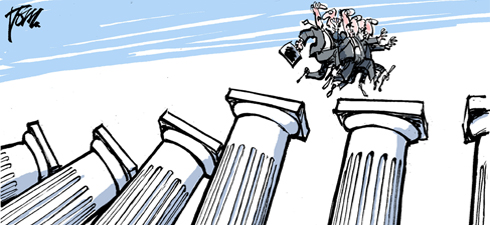It is no overstatement to say that none of the 27 leaders at the summit could be described as having the calibre of a Victor Hugo, or even a Robert Schuman, Jean Monnet or Winston Churchill.
At a moment when there was a critical need for statesmanship and a vision to make sense of Europe’s situation and identify objectives which could restore European momentum - not to mention the fundamental language change needed for how we describe the EU’s goals in this new century - this summit has offered only hard-bitten agreements on technical questions; texts that are unlikely to the inspire hearts and minds of Europe’s citizens and more likely to give them a migraine.
Governed by auditors
The Union has no political leaders, instead we are governed by auditors. Enough said. That is the way it is, and these are the times we live in. Instead of complaining about their unintelligible language - because the language of council decisions is invariably unintelligible - we should take a close look at what has actually been decided.
Some progress has been made. In fact, this summit may turn out to be much better than expected. Whereas previous meetings focused solely on austerity and spending cuts, this summit has broken new ground with a plan for recovery through shared investment. The 27 member states have endorsed a “growth pact” which will inject 120 billion euros into the continent’s ailing economy. At the same time, it has also ushered in a shift in the terms of the debate on Europe, which, though it may not lead to a miracle solution in the short-term, is far from insignificant. And that is not all, there is more.
This summit has also established the foundation for a banking union that will regulate banks throughout the EU, centralise their supervision, and provide a common guarantee for deposits that will put all of the power of the EU behind national banks, so that individual governments will no longer be alone in their bid to cope with bank failures and the debts they may engender.
A real step forward
This amounts to a clear transfer of sovereignty, which will give the Union some of the attributes of a state and enable it to come to the aid of countries that have drifted off course in the financial storm. Couched in the European jargon of the Council, this measure does not look like much, but the language in which it is described disguises a real step forward. And once again, that is not all.
Even more importantly, the 27 member states have also approved the report on greater economic and political integration drafted by the presidents of the Council, Commission, Eurogroup and the European Central Bank, who have been tasked to formulate staged proposals within six months.
Put simply, this means that the Union is prepared to embark on the path to a common economic policy, a common treasury and the sharing of debt, which, when added to the single currency, will give it the real power of a naissant federal state.
This amounts to major change, and one that was immediately underscored by Spain and Italy’s success in pushing through a French supported agreement whereby the European Financial Stability Facility and the European Stability Mechanism can take direct action to support member state banks.
Heated debate
Through this, they can buy the sovereign bonds of countries which, like the two major southern European economies, have been experiencing difficulty even though their books are in order. Needless to say, they had to threaten walk away in order to obtain this concession.
The debate has been heated, but, at the end of the day, financial solidarity and debt mutualisation have prevailed, notwithstanding German opposition and even though they are explicitly ruled out by EU treaties.
In short, statesmen like Victor Hugo may be in short supply, but Europe has nonetheless succeeded in forging ahead.
Do you like our work?
Help multilingual European journalism to thrive, without ads or paywalls. Your one-off or regular support will keep our newsroom independent. Thank you!












